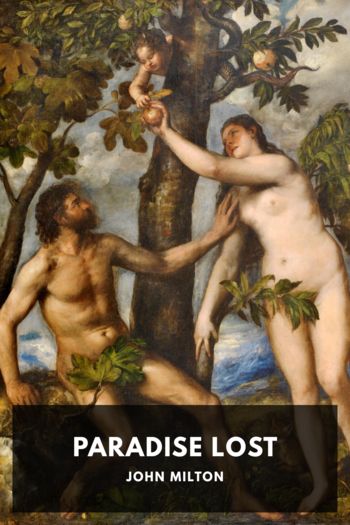Table-Talk by William Hazlitt (best pdf reader for ebooks txt) 📕

- Author: William Hazlitt
Book online «Table-Talk by William Hazlitt (best pdf reader for ebooks txt) 📕». Author William Hazlitt
A poor woman at Plymouth who did not like the formality, or could not afford the expense of a will, thought to leave what little property she had in wearing apparel and household moveables to her friends and relations, viva voce, and before Death stopped her breath. She gave and willed away (of her proper authority) her chair and table to one, her bed to another, an old cloak to a third, a nightcap and petticoat to a fourth, and so on. The old crones sat weeping round, and soon after carried off all they could lay their hands upon, and left their benefactress to her fate. They were no sooner gone than she unexpectedly recovered, and sent to have her things back again; but not one of them could she get, and she was left without a rag to her back, or a friend to condole with her. ↩
The law of primogeniture has its origin in the principle here stated, the desire of perpetuating some one palpable and prominent proof of wealth and power. ↩
It is as follows:
“The Will of a Virtuoso.
“I, Nicholas Gimcrack, being in sound health of mind, but in great weakness of body, do by this my Last Will and Testament bequeath my worldly goods and chattels in manner following:—
“Imprimis, to my dear wife,
One box of butterflies,
One drawer of shells,
A female skeleton,
A dried cockatrice.
“Item, to my Daughter Elizabeth,
My receipt for preserving dead caterpillars,
As also my preparations of winter may-dew, and embrio pickle.
“Item, to my little daughter Fanny,
Three crocodiles’ eggs.
“And upon the birth of her first child, if she marries with her mother’s consent,
The nest of a hummingbird.
“Item, to my eldest brother, as an acknowledgment for the lands he has vested in my son Charles, I bequeath
My last year’s collection of grasshoppers.
“Item, to his daughter Susanna, being his only child, I bequeath my
English weeds pasted on royal paper,
With my large folio of Indian cabbage.
“Having fully provided for my nephew Isaac, by making over to him some years since
A horned scarabaeus,
The skin of a rattlesnake, and
The mummy of an Egyptian king,
“I make no further provision for him in this my will.
“My eldest son John having spoken disrespectfully of his little sister, whom I keep by me in spirits of wine, and in many other instances behaved himself undutifully towards me, I do disinherit, and wholly cut off from any part of this my personal estate, by giving him a single cockleshell.
“To my second son Charles, I give and bequeath all my flowers, plants, minerals, mosses, shells, pebbles, fossils, beetles, butterflies, caterpillars, grasshoppers, and vermin, not above specified: As also my monsters, both wet and dry, making the said Charles whole and sole executor of this my Last Will and Testament, he paying or causing to be paid the aforesaid legacies within the space of six months after my decease. And I do hereby revoke all other wills whatsoever by me formerly made.”
—Tatler volume IV, No. 216↩
Kellerman lately left his heart to be buried in the field of Valmy, where the first great battle was fought in the year 1792, in which the Allies were repulsed. Oh! might that heart prove the root from which the tree of Liberty may spring up and flourish once more, as the basil tree grew and grew from the cherished head of Isabella’s lover! ↩
How careful is Sir Joshua, even in a parenthesis, to insinuate the obligations of this great genius to others, as if he would have been nothing without them. ↩
If Sir Joshua had an offer to exchange a Luca Giordano in his collection for a Claude Lorraine, he would not have hesitated long about the preference. ↩
Written in 1788. ↩
Gainsborough. ↩
Sir Joshua himself wanted academic skill and patience in the details of his profession. From these defects he seems to have been alternately repelled by each theory and style of art, the simply natural and elaborately scientific, as it came before him; and in his impatience of each, to have been betrayed into a tissue of inconsistencies somewhat difficult to unravel. ↩
He had been before speaking of Boucher, director of the French Academy, who told him that “when he was young, studying his art, he found it necessary to use models, but that he had left them off for many years.” ↩
The Fifth Discourse. ↩
These are Sir Joshua’s words. ↩
I do not know that; but I do not think the two passions could be expressed by expressing neither or something between both. ↩
“As for politics, I think poets are tories by nature, supposing them to be by nature poets. The love of an individual person or family, that has worn a crown for many successions, is an inclination greatly adapted to the fanciful tribe. On the other hand, mathematicians, abstract reasoners of no manner of attachment to persons, at least to the visible part of them, but prodigiously devoted to the ideas of virtue, liberty, and so forth, are generally whigs. It happens agreeably enough to this maxim, that the whigs are friends to that wise, plodding, unpoetical people, the Dutch.” —Shenstone’s Letters, p. 105 ↩
To give





Comments (0)